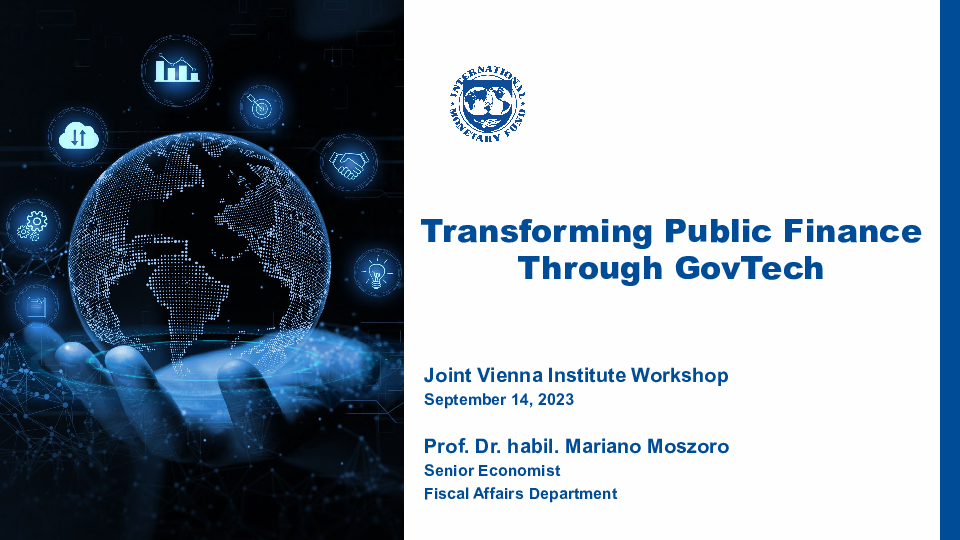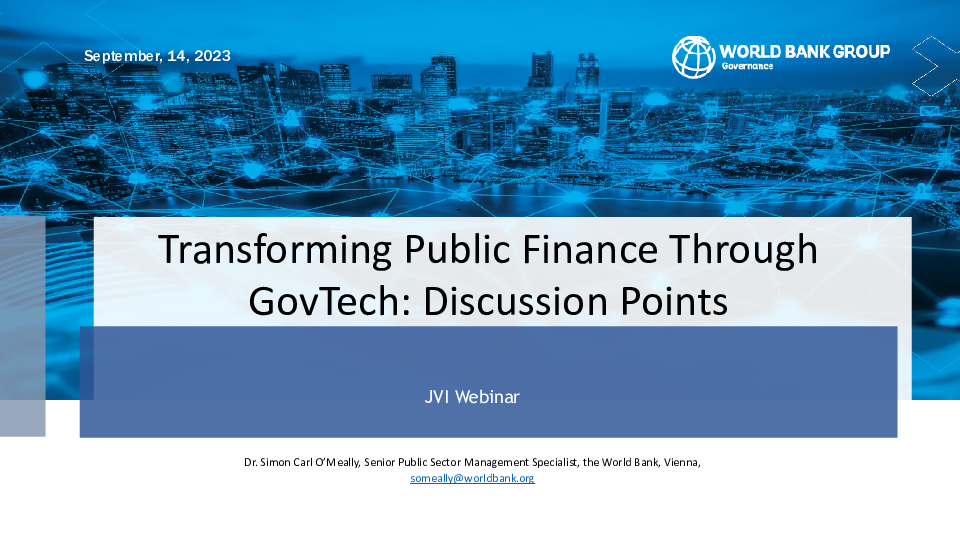Transforming Public Finances Through GovTech
Thursday, September 14, 2023, at 2:00-3:30 p.m. Vienna time (CET)
Presenter
Mariano Moszoro, Senior Economist, IMF, Fiscal Affairs Department
Discussants
Agnieszka Gajewska, Global Government and Public Services Leader, PwC
Simon Carl O’Meally, Senior Public Sector Management Specialist, The World Bank
Moderator
Markus Eller, Senior Economist, Joint Vienna Institute
Continuing a recent series of JVI webinars addressing the economic impacts and policy challenges of digitalization (previously held on September 16, 2022 and January 18, 2023), the JVI hosted a webinar on September 14, 2023, focusing on the transformation of public finances and government operations driven by technological innovations, commonly referred to as “GovTech”. This webinar emphasized the substantial potential of digitalization to significantly enhance the effectiveness and efficiency of government operations, leading to favorable outcomes across various domains. For instance, one can think of more precise and targeted government spending, advancements in critical sectors such as education and healthcare, streamlined revenue collection processes, and a more user-friendly government interface for the citizens of a country.
Mariano Moszoro, Senior Economist at the IMF’s Fiscal Affairs Department, commenced by introducing the main findings of a recent IMF cross-country study on GovTech. He demonstrated that the digital divide persists both across and within countries, limiting the ability of many governments to fully harness the potential of GovTech. He underscored the pivotal role that governments can play in promoting digital adoption, highlighting the need for intervention on both the supply side, such as investing in digital infrastructure, and the demand side, like making internet access more affordable. Notably, he acknowledged significant variations among countries. For instance, when referencing countries in the JVI region, he pointed out that the investment requirements for digital infrastructure are five times higher in the Caucasus and Central Asia compared to emerging and developing Europe. Furthermore, despite a substantial decrease in nominal prices for mobile-broadband services over the past decade, the average cost relative to per capita income in 2020 was nine times higher in low-income developing countries than in advanced economies. Mr. Moszoro also highlighted the substantial economic and fiscal benefits of digital adoption once connectivity and affordability are improved. These include enhanced tax collection (e.g., through technologies like machine learning for detecting tax fraud), increased fiscal transparency and spending efficiency, improved education and healthcare outcomes (e.g., through systems like e-prescriptions that warn of drug interactions), and more robust social safety nets (e.g., through better identification, eligibility verification, and payment mechanisms). However, Mr. Moszoro also emphasized that digitalization should not be seen as a replacement for good governance. Comprehensive legal and institutional reforms are necessary to ensure that governments can fully leverage the advantages of digitalization while effectively managing associated risks, such as those related to data protection and cybersecurity.
Agnieska Gajewska, Global Government and Public Services Leader at PwC, raised the critical question of whether governments are effectively keeping pace with the rapidly accelerating technological innovations. Among the primary challenges impeding government adoption of digital solutions, she underscored issues such as deficiencies in change management, inadequate funding, and a shortage of adequately skilled digital personnel within the public sector. Expanding on the earlier emphasis on the digital divide, she emphasized that governments in emerging and developing countries still lag behind advanced economies in their allocation of expenditure toward ICT products and services. Additionally, she highlighted the importance of smart regulations on both a global and local scale. This includes considering issues like the highly concentrated semiconductor market at the global level and the appropriate utilization of generative AI techniques at the local level.
Simon O’Meally, Senior Public Sector Management Specialist at The World Bank, further explored the factors contributing to the digital divide, highlighting that even in countries that are highly advanced in terms of digitalization, substantial disparities in digital inclusion persist. These disparities stem from various challenges, including the imperative to extend connectivity to the remote “last mile”, tackle digital literacy and accessibility issues for individuals with disabilities, and employ innovative approaches like combining face-to-face and digital channels. He stressed the crucial role of international financial institutions (IFIs) in providing additional funding to support countries in addressing the digital divide, particularly in the context of tightening global fiscal constraints. Additionally, he acknowledged that vested interests could hinder digitalization efforts. Therefore, he underscored the necessity of a comprehensive reform strategy to enhance public sector governance and effectively integrate digitalization reforms.
The Q&A session centered on the following main issues:
Firstly, the discussion delved into the question of whether successful implementation of GovTech hinges more on prioritizing the right technologies or on the quality of institutions and governance. Speakers emphasized that while advanced technologies are undeniably important, their effectiveness relies on strong institutions and a qualified public workforce. However, it was acknowledged that implementing cutting-edge technologies often comes with higher costs, which can strain countries already subject to tight budgets. On the other hand, it was noted that countries starting later in their GovTech journey can “leapfrog” and embrace more ambitious and effective technologies, facilitating their catch-up process with global frontrunners. India served as an illustrative example of such progress, as did recent technological innovations in Central Asia aimed at enhancing tax compliance within broader tax reforms. In terms of institutional quality, the speakers stressed that GovTech inherently involves multisectoral, interinstitutional, and multidisciplinary elements. Consequently, its successful implementation depends on the state’s capacity to coordinate, lead diverse teams, engage in effective internal and external communication, and leverage private sector expertise through suitable procurement and partnerships. Additionally, reducing regulatory capture and fostering competition in the provision of essential digital infrastructure emerged as crucial institutional components.
Secondly, it was discussed what can be learned from countries in the JVI region that are considered global GovTech leaders, such as Estonia. Affordability, crucial for both devices and services, emerged as a key factor, particularly for poorer households. Government subsidies were proposed to enhance affordability, recognizing the economic benefits of positive network externalities arising from connecting the unconnected. Moreover, the discussion emphasized the importance of minimizing technical barriers to GovTech usage and enhancing digital education for the broader public, including the development of local language applications and user-centric solutions with appropriate human assistance. As an illustrative recent success story, Ukraine’s DIIA was mentioned, which combines a mobile app with access to digital documents and a unified portal for public services, already used by about a half of the Ukrainian population and aiming to achieve full online service availability.
Finally, the conversation turned to the role that IFIs can play in advancing the digital transformation of the public sector, complementing their financial support mentioned earlier. Speakers emphasized the potential for integrating more systematically policy recommendations to promote GovTech adoption into widely accessible monitoring tools, including as part of the IMF’s Article IV consultations. Another important contribution lies in providing tailored technical assistance and capacity development initiatives. The latter also encompasses training courses offered at the JVI, where, in addition to existing courses on digitalization and money and finance, a new course on GovTech, led by the IMF’s Fiscal Affairs Department, is scheduled for launch in June 2024.
Markus Eller, Senior Economist, JVI











